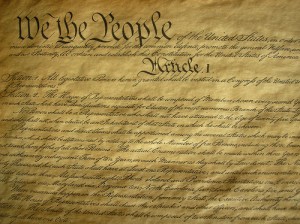Constitution
NDAA v. Constitution Round Two

A court enjoined the National Defense Authorization Act (NDAA) yesterday, even as the House prepares to pass another version of it.
Setback for the NDAA
The case against the NDAA (Hedges et al. v. Obama et al., 12-cv-00331-KBF, US District Court, Southern District of New York) said that the new law threatened the civil liberties of ordinary Americans. Specifically, the plaintiffs feared that, if they criticized, condemned, or complained about the War on Terror, the government might accuse them of giving “substantial support” to al-Qaeda, the Taliban, and other such groups. At issue is Sections 1021 and 1022 (formerly 1031 and 1032). These authorize the President to detain indefinitely anyone suspected of:
- Acting like a terrorist, or
- Giving aid and comfort to one.
The problem: Sections 1021 and 1022 are vague enough to let the President detain anybody. Nor is the new law clear enough about protecting a citizen of the United States from summary arrest or detention under those sections.
The plaintiffs read like an “honor guard of the American left.” They include:
- Christopher Hedges, New York Times.
- Daniel Ellsberg, of Pentagon Papers fame. (See US v. New York Times and Washington Post)
- Noam Chomsky
They also include Birgitta Jonsdottir, a dovish Member of Parliament from Iceland.
The defendants include putative President Barack Obama, Defense Secretary Leon Panetta, Senator (and sponsor) John McCain, Senate Floor Leaders Harry Reid and Mitch McConnell, House Speaker John Boehner, and House Floor Leaders Eric Cantor and Nancy Pelosi.
The plaintiffs filed their anti-NDAA suit on January 13. In March, Judge Katherine B. Forrest held a hearing. The government called no witnesses and introduced no evidence. They cross-examined the plaintiffs and their witnesses; that was all. Hedges testified that he had changed the way he reported on 17 groups that the State Department has on its “terrorist group” list.
So yesterday Judge Forrest enjoined the government from enforcing the detention-law parts of the NDAA. The case has not come to trial; this is an order on a motion for a preliminary injunction. In the sixty-eight-page opinion and order, Judge Forrest held that the government had its chance to show that the plaintiffs would not face arrest or detention under the NDAA, and they did not. Judge Forrest further said that some of the terms in the NDAA were “so vague” that no citizen could be sure that he would not break that law. The judge took particular issue with:
- What is a covered person?
- What are associated forces?
- What does it mean, to support substantially al-Qaeda, the Taliban, or associated forces?
The judge recognized that “associated forces” has special meaning under the Laws of War. But the government never defined the phrase substantial support in such a way as to let everyone know when he or she might be guilty of that.
The order says that Congress needs to define covered person and substantial support better before they can enforce this law.
House acts on NDAA 2013
The House of Representatives is working on an NDAA for 2013. The House Armed Services Committee reported NDAA 2013 to the full House and recommended that the House pass it. Joe Wolverton, writing in New American, alerted his readers that this bill is just as dangerous as NDAA 2012, which Judge Forrest enjoined yesterday. Wolverton took particular issue with new text saying only that the writ of habeas corpus would be available to anyone under detention under the NDAA or the earlier Authorization for the Use of Military Force. That, says Wolverton, was not the problem. The problem was how to keep the government from detaining American citizens in the first place.
Representatives Justin Amash (R-MI) and Adam Smith (D-WA) have introduced an amendment to repeal the detention-law text of the NDAA.
Related:
Detention law and the Constitution
[amazon_carousel widget_type=”ASINList” width=”500″ height=”250″ title=”” market_place=”US” shuffle_products=”True” show_border=”False” asin=”B00375LOEG, 0451947673, 0800733940, 0062073303, 1595230734, 1936218003, 0981559662, 1935071874, 1932172378, 1936488299″ /]

Terry A. Hurlbut has been a student of politics, philosophy, and science for more than 35 years. He is a graduate of Yale College and has served as a physician-level laboratory administrator in a 250-bed community hospital. He also is a serious student of the Bible, is conversant in its two primary original languages, and has followed the creation-science movement closely since 1993.
-

 Executive4 days ago
Executive4 days agoSecret Service chief gets no solace
-

 Executive3 days ago
Executive3 days agoWaste of the Day: Louisville Taxpayers Pay Nearly $600,000 For Empty Building’s Maintenance, Security
-

 Guest Columns4 days ago
Guest Columns4 days agoFear Itself: Democrats’ Favorite Strategy Caused Their Current Chaos
-

 Executive3 days ago
Executive3 days agoWhere is Joe Biden – or Jill?
-

 Executive1 day ago
Executive1 day agoWaste of the Day: Throwback Thursday: Cities Used Crime Prevention Funds on Soccer Games, Paper Shredding
-

 Executive2 days ago
Executive2 days agoFacile and politically motivated suggestions
-

 Civilization4 days ago
Civilization4 days agoBuild Iron Dome in the United States To Prepare for Israel’s Worst Day
-

 Executive4 days ago
Executive4 days agoThe Emerging GOP Plan To Beat Kamala Harris















